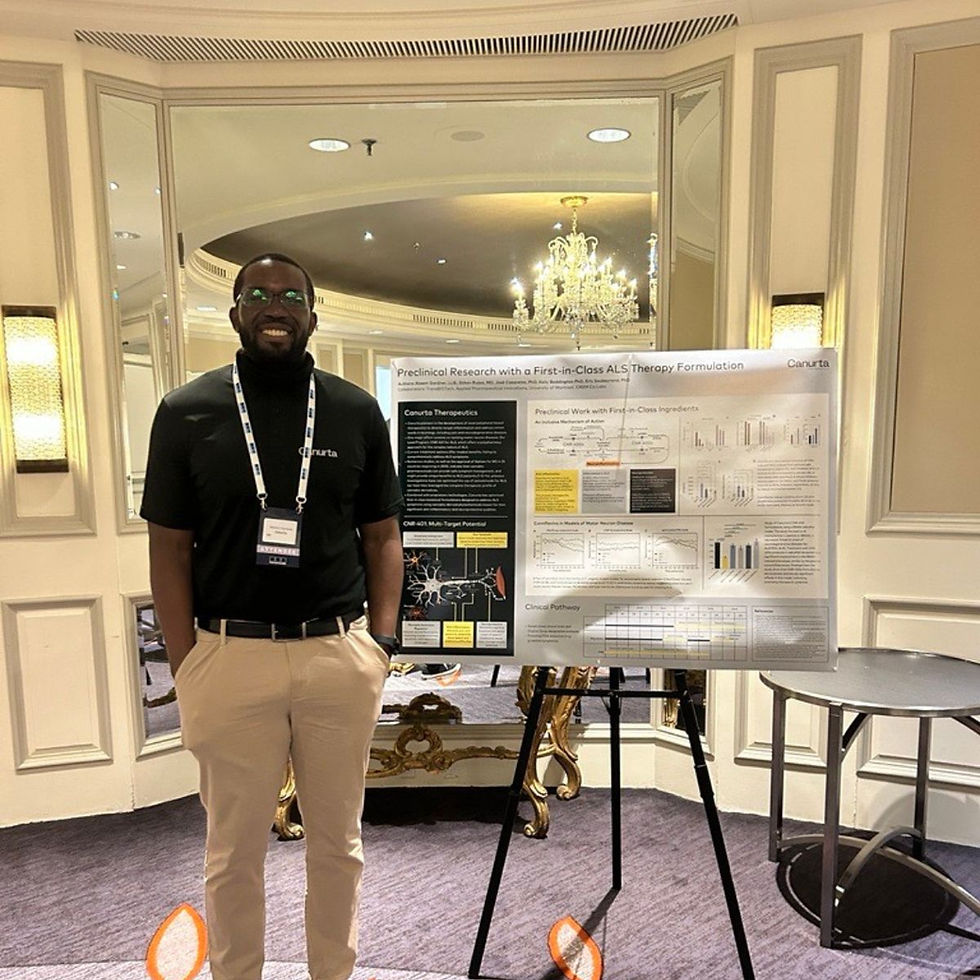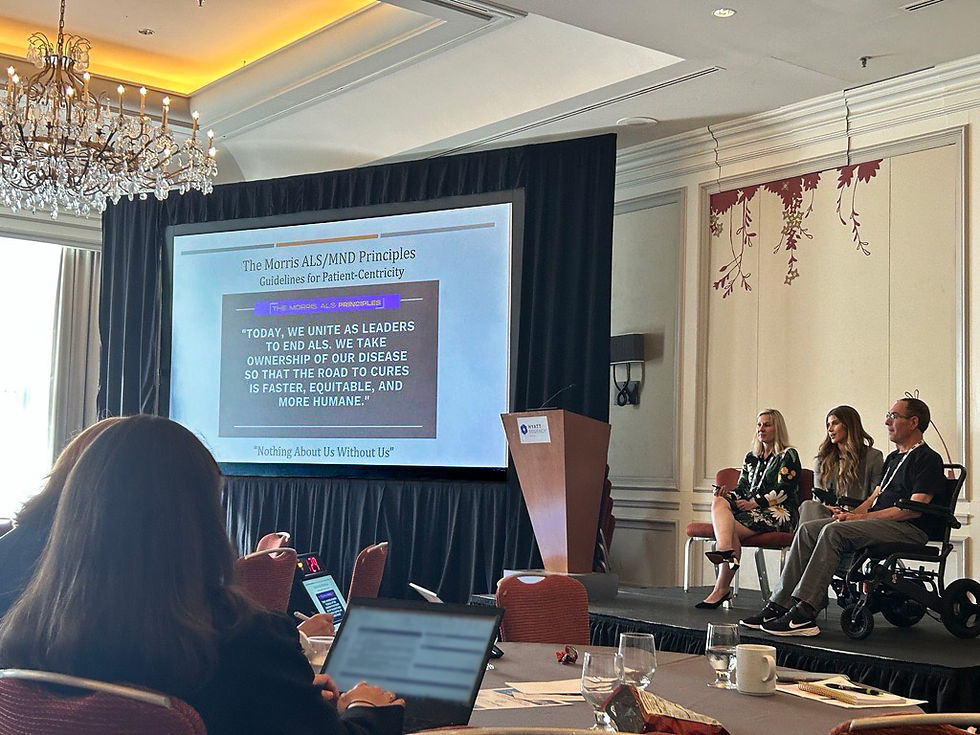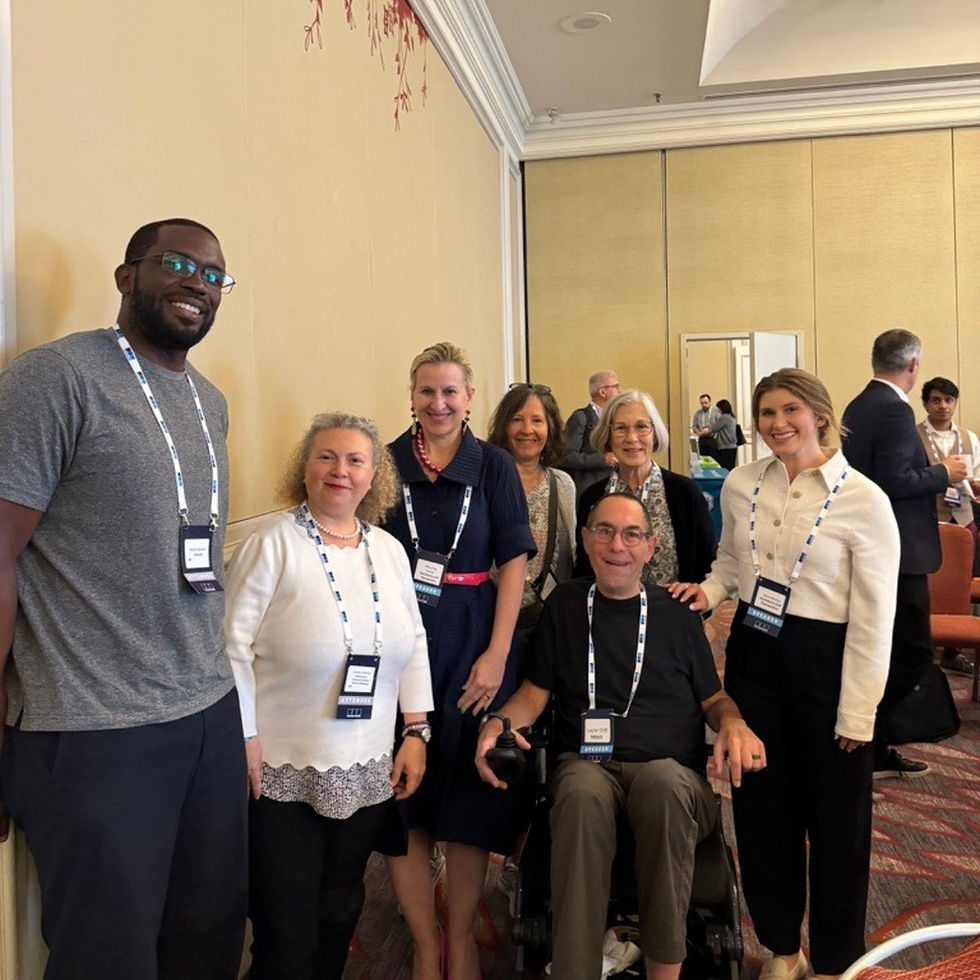Reflecting on the ALS Drug Development Summit in Boston
- Akeem Gardner
- May 24, 2024
- 3 min read
Updated: Aug 27, 2024

This week, I had the opportunity to attend the ALS Drug Development Summit in Boston, an event that brought together the brightest minds and most dedicated individuals in the field of neurodegenerative disease research and patient advocacy efforts. I was proud to o present our poster, "Pre-Clinical Research with a First-In-Class ALS Therapy Formulation," on behalf of the Canurta team, showcasing some of the promising pre-clinical data on CNR-401, our candidate for disease modification and symptom management in ALS and other neurodegenerative diseases.
From the moment I arrived in Boston, the energy and enthusiasm were palpable. I was not only able to visit my friends at ALS Technical Development Institute as they are celebrating their 25th anniversary and dedication to ALS research and drug development, but the Summit itself was amazing, kicking off with a series of workshops that set the tone for the coming days. These 3 days highlighted the current state of ALS research and underscored the urgency of developing effective treatments.

Over the two main presentation days, several key themes emerged:
1. Combination Therapies It became clear that the future of ALS treatment lies in multi-functional therapeutics. Single-target therapies often fall short in addressing the complex, multifactorial nature of neuron degeneration and the heterogeneity of ALS. This reinforces the direction we're taking with CNR-401, aiming to offer a comprehensive solution.
2. Biomarkers and Objective Measures: The importance of biomarkers in assessing treatment efficacy was a recurrent topic. The entire ALS community is pushing for objective measures of benefit, and Canurta is committed to contributing to this effort. Collaborating with regulators, patients, and caregivers and using the advanced digital tools available today will be crucial in this endeavor.
3. Expanded Access Programs (EAPs) The ethical imperative of providing patients with continued access to effective treatments post-trial was emphasized. EAPs not only benefit patients but also allow for the collection of longitudinal data, which can be invaluable for future research and development decisions. We will have EAP programs in all our clinical efforts as we have to remember that the patients come first and we owe them the right to use our therapeutics, especially if some are receiving benefit.
4. Patient Engagement: A resounding message from the summit was "Nothing for us Without Us." This community will be equals in the development of treatments for the disease that has changed patients and their families lives — they will participate in their own care. So we must engage with patients early and often, establishing patient advisory boards, and incorporating their insights can significantly enhance research outcomes. This approach aligns perfectly with our ethos at Canurta.
5. Learning from the Past to ensure a Strong Future: A sentiment echoed by many was the importance of building on previous research. In life the greats know, there are no failures, only lessons learned. This philosophy drives my continued curiosity and eagerness to learn all I can so I can put my best foot forward when it comes to executing towards a future free from ALS.
6. Community and Collaboration: One of the most inspiring aspects of the every ALS event I go to is the strong and beautiful sense of community. The determination and positivity of patients, caregivers, and researchers continues to inspire me and uplift my spirit. It's a reminder of why we do what we do and the impact we can have.

Akeem Gardner with members of Brain Storm Cell Therapeutics Patient Advocacy Team, Dr. P. Hande Ozdinler Professor of Neurology at Northwestern University, and Layne Oliff from IAMALS and his wife, and Mira, mother and Caregiver of Matt (living with ALS) 🤞🏾
I was excited that our work and strategies at Canurta was met with great interest and support. The potential role of botanical therapeutics, utilizing Cannabis sativa, was well-received as many know — cannabis can help with symptom management, it always has and always will. It's clear that there is a growing recognition of the therapeutic potential of plant-based solutions in the fight against ALS.
So now I have left Boston more motivated than ever. We are on a mission to end ALS, and while Canurta might not be the one to discover the ultimate cure, I am determined to contribute significantly to the cause. Our research, resilience, and commitment to improving the quality of life for ALS patients will drive us forward — and I will be sure that our commitments are meaningful and have benefit.
For a closer look at our research and the exciting developments from the summit, check out our poster presentation below. And keep an eye out as through the year we will continue to share rapidly as our conference participation and research picks up leading to Montreal at the end of the year and thank you everyone who took the time to say hi and have a conversation with me. You all are the best and have no clue how much your time meant to fueling my drive.

See you all soon,
Akeem Gardner
CEO & Founder
My husband had ALS/MND programme about 4 months ago. he no longer requires a feeding tube, sleeps soundly, works out frequently, and is now very active. It doesn’t make the ALS go away but it did give him better quality of life. we got the treatment from vinehealthcentre. com